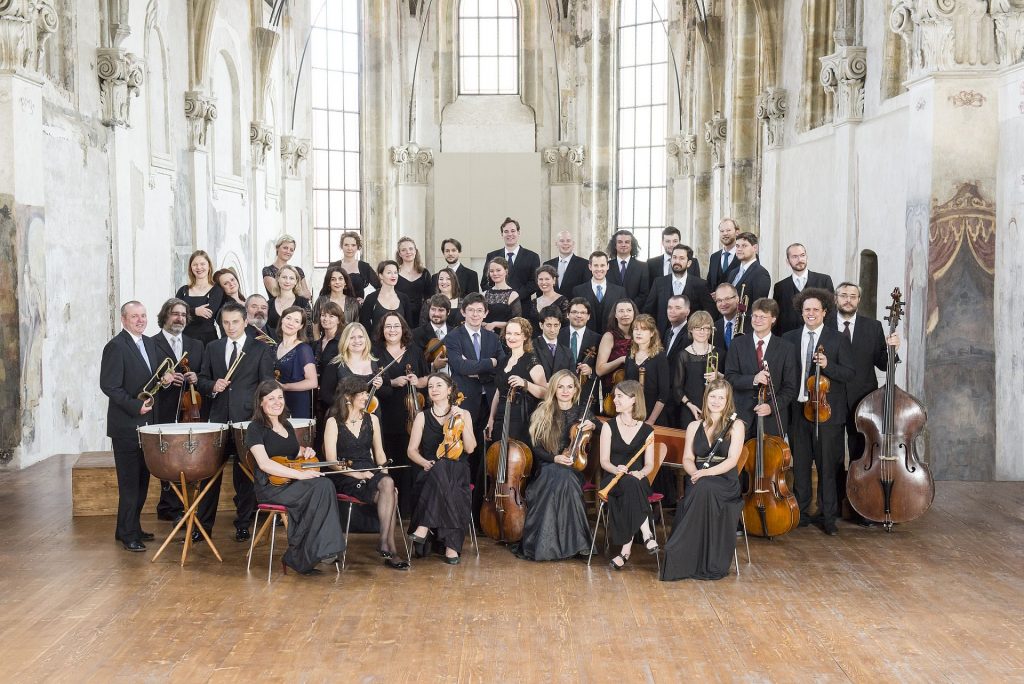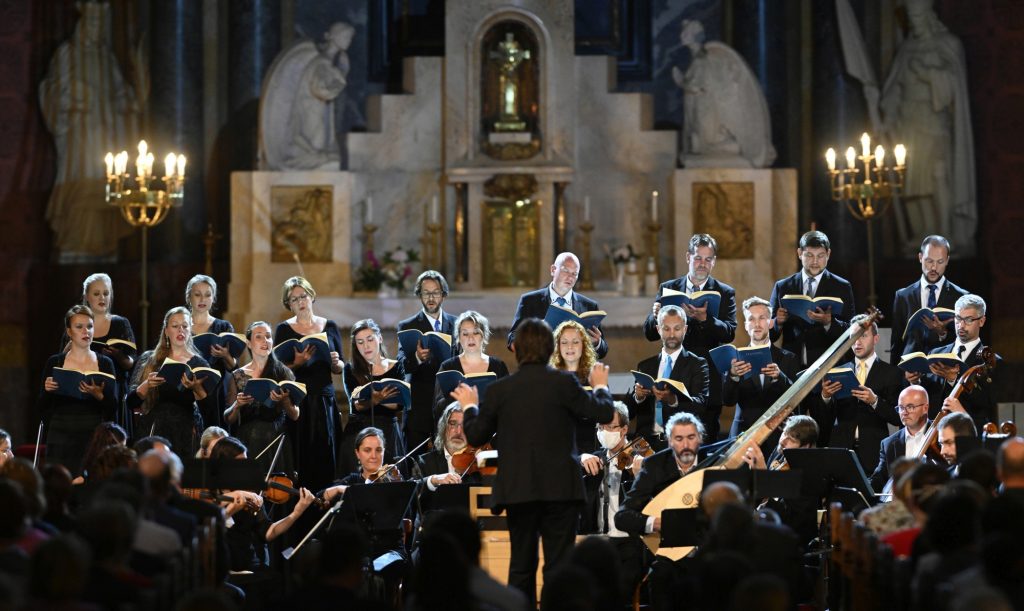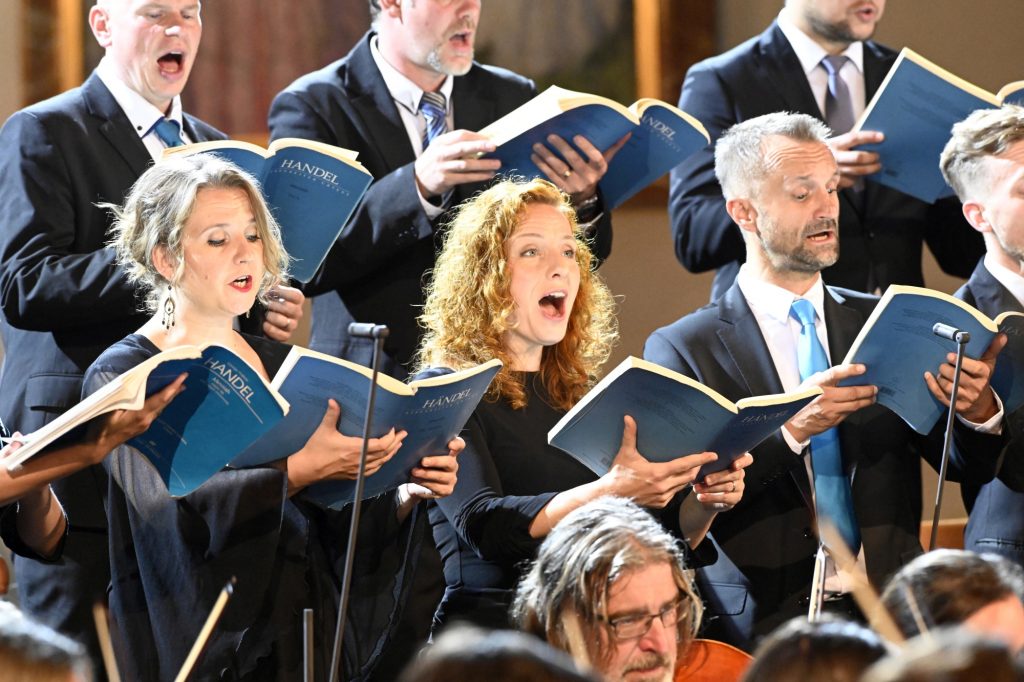The Collegium 1704 and Collegium Vocale 1704 ensembles were founded by the harpsichordist and conductor Václav Luks in 2005 on the occasion of the Bach–Prague–2005 project, marking the beginning of residential collaboration with the Prague Spring International Music Festival.
Since 2007, after their huge success with Zelenka’s Missa votiva in France, Collegium 1704 has been regular guest at festivals around Europe – besides performing the fundamental pieces of baroque repertoir, promoting work of Czech masters like Jan Dismas Zelenka and Josef Mysliveček.
In 2008, they began the Prague-Dresden Musical Bridge concert series, which continues the rich cultural traditions of the two cities. Collaboration with the renowned soloists Magdalena Kožená, Vivica Genaux, and Bejun Mehta naturally led, in 2012, to a second concert series, called Collegium 1704 in the Rudolfinum (formerly Baroque Opera Stars), held at the Rudolfinum – Dvořák Hall in Prague. Since autumn 2015, the two concert series merged into one Season held in Prague and Dresden. In 2019, Collegium Vocale 1704 launched a series of chamber choir concerts in Prague.
Following international successes with opera performance of Handel’s Rinaldo (directed by Louise Moaty) in 2009, the year of 2013 was devoted to rediscovery of the Czech composer Josef Mysliveček. His opera l’Olimpiade (directed by Ursel Herrmann) was presented by Collegium 1704 in Prague, Caen, Dijon, Luxembourg, Theater an der Wien and nominated for The International Opera Awards 2014. In 2017, Collegium 1704 gave the modern-era world premiere of Antonio Vivaldi’s Arsilda, regina di Ponto (directed by David Radok, 2017), its first hearing in over 300 years, in Bratislava. Further performances took place at the Opéra de Lille, in Luxembourg, at the Opéra Royal Versailles, and in Caen.
Collegium 1704 has received invitations recently from such prestigious presenters as the Salzburger Festspiele (2015, 2016, 2018), the Berliner Philharmonie, London’s Wigmore Hall, Vienna’s Theater an der Wien and Konzerthaus, the Lucerne Festival, BOZAR (Palais des Beaux-Arts) in Brussels, the Chopin Festival in Warsaw, Wratislavia Cantans, and the Elbphilharmonie Hamburg, and it is an ensemble-in-residence at the prestigious festival Oude Muziek in Utrecht and at the Leipzig Bachfest.
Radio and television stations throughout Europe broadcast many Collegium 1704 concerts live and recorded. In 2014, Collegium 1704 and Vaclav Luks collaborated with Bejun Mehta on a DVD project of Gluck’s opera Orfeo ed Euridice and a BBC Two documentary “Mozart in Prague”, starred by Ronaldo Villazon. The ensemble took part in making the director Petr Václav’s epic film Il Boemo about the life of Josef Mysliveček. The recordings of Collegium 1704 are popular with listeners and music critics (they have repeatedly won the Diapason d’Or, CD of the Month & Editor’s Choice, and nominations for CD of the Year Gramophone Magazine). Among their successful CD recordings have been the Violin Concertos of Josef Mysliveček, Oboe concertos and cantatas and the B Minor Mass by Johann Sebastian Bach, the world premiere of J. D. Zelenka’s Missa Divi Xaverii and Sonatas (both Zelenka recordings were honoured with the prestigious Diapason d’Or). In 2019, Collegium 1704 issued the first complete Czech recording of Handel’s Messiah and a collection titled Il giardino dei sospiri with selections from Baroque secular cantatas sung by Magdalena Kožená. The latest recording is an imaginary mass by J. D. Zelenka, Missa 1724.
… and why 1704?
1704 is a symbolic year of Jan Dismas Zelenka, our armorial composer. In August 1704 the church of St. Nicholas in Prague witnessed the magnificent performance of Zelenka’s Jesuit allegory play – Via Laureata. As we don’t know anything about Zelenka’s previous life, this event signifies the arrival of some of the most remarkable personalities of the 18th century music of the European music scene.









